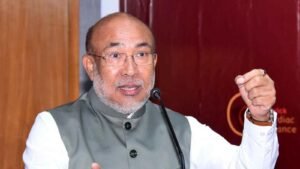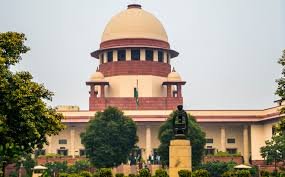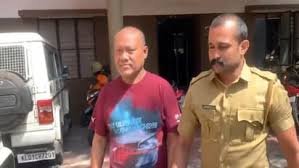The arrest of Arambai Tenggol commander Kanan Singh ignited a firestorm of protests and violence in the Imphal Valley, leading to widespread curfews, communication blackouts, and clashes with security forces. This incident, alongside land disputes and alleged police incursions, underscores the volatile socio-political landscape.
BY Navin Upadhyay
June 26, 2025 — Manipur is sliding dangerously back into chaos, with a string of deadly incidents across both the valley and hill districts underscoring the collapse of state authority and the deepening ethnic chasm between Meitei and Kuki-Zo communities. The latest round of violence, coupled with escalating tensions and a significant civilian uprising in the Imphal Valley, paints a grim picture of a state teetering on the edge of anarchy.
Fresh Violence and Deepening Ethnic Divide
In the latest round of violence, a Kuki woman was killed in crossfire between security forces and unidentified gunmen on June 19 in Bishnupur district, while a Meitei farmer was shot and wounded in a separate incident. These attacks, and the unrest that followed them, reflect the larger pattern of ethnic polarization that has engulfed the state for over a year.
Elsewhere, land disputes have flared into violence. On the boundary between Imphal East and Kangpokpi districts, Kuki and Meitei villagers clashed over ploughing rights in Sadu Lampak. The confrontation—marked by stone-pelting, bamboo-staff attacks, and at least one gunshot—left multiple people injured before police arrived to disperse the crowd.
Police Incursion Sparks Outrage in Thingkangphai
Tensions reached a boiling point again on June 25 in Thingkangphai, a Kuki-majority village in the Chakpikarong subdivision of Chandel district. Residents were outraged after Meitei police personnel reportedly entered the area, reigniting trauma from a June 2023 incident in which the village was torched by mobs alleged to be aided by security forces using state-supplied vehicles. Though a few displaced Kuki families had recently begun to return and rebuild their lives, the sudden police presence sparked street protests, particularly among women demanding accountability.
“We want to know who allowed Meitei police to enter this village after what happened to us,” said a local woman activist, requesting anonymity. Community leaders are currently engaged in discussions with Indian Army officials to ascertain who authorized the incursion.
Unrest in Imphal Valley: A Firestorm After Kanan Singh’s Arrest
The unrest in the hill districts comes amid turmoil in the valley, where the arrest of Arambai Tenggol commander Kanan Singh on June 7 by the Central Bureau of Investigation triggered violent protests. Singh, a former police head constable, is seen as a key figure in the valley’s Meitei nationalist mobilization. His arrest led to widespread chaos, including arson, road blockades, and gunfire in parts of Imphal.
READ: Congress Accuses ECI of Evading Questions on Voter List Transparency
Upon learning of the arrest at Imphal Airport, protesters unleashed chaos across multiple valley districts. In Imphal East, a bus transporting central forces was set ablaze in Khurai Lamlong. Roads in Kwakeithel, Uripok, and Yairipok were obstructed with burning tires, furniture, and debris. Demonstrators also torched a police post in Yairipok and dug up the road to prevent security movements. Amid the turmoil, sporadic gunfire erupted from protesters targeting security forces in areas near Kangla Gate and Kangpokpi, forcing authorities to deploy tear gas and open fire to disperse crowds.
#Manipur
Minority tribal Kukis held a massive rally in Kangpokpi today to protest against the arbitrary arrests of our innocent people by biased security agencies such as @NIA_India @CBIHeadquarters instead of arresting the main culprits like Korounganba Khuman & @NBirenSingh. pic.twitter.com/5MREul1LDj— David 𝐊𝐮𝐤𝐢 (@KipsKuki) June 25, 2025
Authorities swiftly imposed curfews across five districts—Imphal East, Imphal West, Bishnupur, Thoubal, and Kakching—while suspending mobile and internet services for five days in an effort to contain the unrest. Despite these measures, the violence left at least 11 people injured, including minors and two journalists, and led to multiple arrests.
 READ: Biren Singh: Assembly Clause Changed to Destabilize Manipur
READ: Biren Singh: Assembly Clause Changed to Destabilize Manipur
The 10-day shutdown, decreed by Arambai Tenggol, effectively brought the valley to a standstill. Public transport ceased, markets shut down, and daily wage labor came to a halt. Protesters, many of them youth supporters of Arambai Tenggol, launched a valley-wide bandh, effectively paralyzing normal life. In a controversial move, some demonstrators even attempted self-immolation. The unrest gained political traction when a group of 25 MLAs and Rajya Sabha MP Leishemba Sanajaoba submitted a memorandum to the governor, demanding Singh’s release.
In a notable shift in policing, authorities invoked provisions under the new Bharatiya Nagrik Suraksha Sanhita (BNSS), redirecting first-time youth offenders to community service tasks—such as cleaning debris and dismantling roadblocks—instead of charging them criminally.
Although the bandh was officially lifted on June 17, protests continue, and the valley remains heavily policed. Curfews have been relaxed in some areas, but the air is still thick with tension. The unrest has not only reignited the ethnic and political divides in Manipur but also revealed the depth of support that groups like Arambai Tenggol continue to command within the valley.
New Protests Erupt in Imphal Following Bomb Blast
Within the ten days, protestors were again back on the streets of Imphal—this time women. Women of Naoremthong Yumnam Leirak staged a sit-in protest on June 22 against a bomb blast that took place the previous day near the house of former Deputy Chief Minister Y. Joykumar Singh. The protest was held at the site of the explosion along DC Road.
The blast happened around 1:10 PM on June 22, when a low-intensity bomb went off at a Meira Shang (local shed). Luckily, no one was injured in the incident; however, the blast caused fear and concern among the residents of the area.
Clashes and gunfire have broken out in Imphal following the capture of Arambai Tenggol members from the Meitei community. pic.twitter.com/jAIKY4xd7s
— Alpha Defense™🇮🇳 (@alpha_defense) June 7, 2025
The women’s group condemned the attack and demanded that the authorities take responsibility for the security failure that allowed such an incident to happen in a busy area. The protesters questioned why a crowded place was targeted and called on everyone to maintain peace, urging all groups to avoid actions that could put the lives of innocent civilians in danger.
Mounting Pressure from Kuki-Zo Organizations
A wave of sustained protests has also engulfed Manipur’s Kuki-Zo heartlands, as civil society organizations mobilize opposition to what they describe as arbitrary arrests of community leaders and activists by central agencies.
READ: Bloodshed in Guanajuato: Massacre at Catholic Celebration
On May 31, the Kuki Women Organisation for Human Rights (KWOHR) convened hundreds of tribal women at the Wall of Remembrance in Tuibong, demanding the release of activists detained by the NIA and CBI, accusing them of stifling tribal voices through selective arrests. Days later, over 100 tribal women demonstrated at Brig. M. Thomas Ground in Kangpokpi, denouncing that “CBI & NIA should act as Centre agencies and not state puppets.” The Committee on Tribal Unity (CoTU) added solidarity with a sit-in at Sapormeina, pressing for a separate hill administration and accountability from central agencies.
On June 21, CoTU imposed an indefinite shutdown in Churachandpur, halting schools, businesses, and transport, following the killing of Hoikholhing Haokip—wife of a village chief—during a security operation. A 24-hour shutdown was also enforced in Kangpokpi the same day. CoTU’s demands are clear: immediate accountability from authorities, swift, impartial investigations, and enforcement of buffer-zone protections. KWOHR condemned the death as a “horrific act of violence” and denounced systemic failure to safeguard tribal civilians.
KWOHR and CoTU allege that while Kuki-Zo leaders face harsh, evidence-light arrests, Meitei extremist figures walk free, pointing to the continued freedom of Korounganba Khuman, an Arambai Tenggol commander accused of arms looting. CoTU further highlighted unresolved killings allegedly by Meitei militants, calling for equal legal accountability. Both organizations have presented detailed petitions to Union Home Minister Amit Shah via the Churachandpur Deputy Commissioner, demanding transparent judicial review, legal action against Meitei militants, constitutional protections, tribal disarmament, and guaranteed political representation.
A Crisis Without a Center
Civil society groups have also expressed shock over the alleged killing of a differently abled Muslim man during this period of valley unrest. Adding to the state’s grim tally, a student excursion bus was attacked on June 24 near Imphal, injuring several students.
The Manipur government has promised tighter security for vulnerable communities and better coordination between state and central forces, but trust is wearing thin. Both Meitei and Kuki communities accuse the other of encroachment, provocation, and collusion with law enforcement. Meanwhile, observers say the administration’s repeated use of curfews and communication blackouts may be exacerbating the crisis by shutting down avenues for verification, negotiation, and transparency.
At the heart of the conflict lies a combustible mix of ethnic tension, contested land rights, weak policing, and historical trauma. While local shutdowns, community protests, and retaliatory violence continue to erupt, the state appears paralyzed—unable to rebuild trust or prevent further escalation.
Manipur’s conflict, now over a year old, has killed more than 250 people and displaced tens of thousands. The most recent surge in violence suggests the state may be spiraling into a longer and more dangerous phase of communal separation—one that could fragment Manipur along permanent ethnic lines if not urgently addressed.














